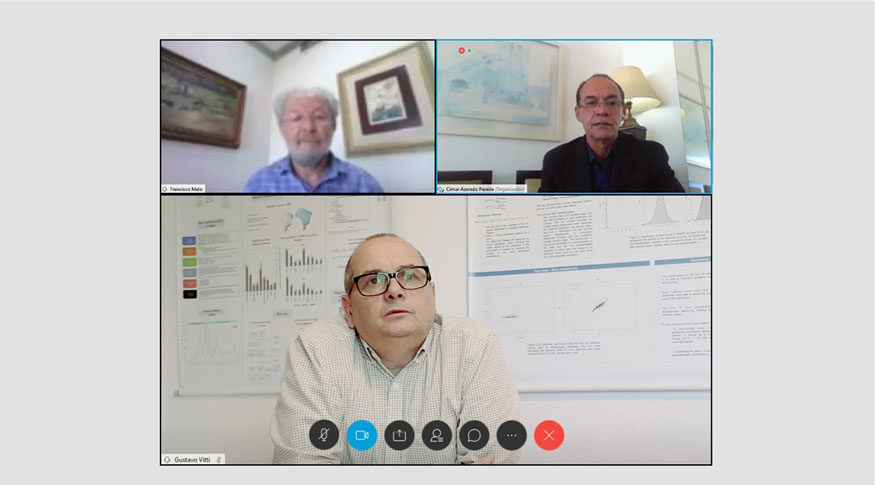Evento Online
Seminar recalls 40 years of IPCA, discusses future of inflation measurement
August 14, 2020 04h50 PM | Last Updated: August 18, 2020 11h51 AM

"The IBGE is the house of figures, the house of precision, and so it should be." The brief description – albeit true – of the Brazilian Institute of Geography and Statistics´mission was stated by economist Francisco de Assis Moura de Melo in a seminar held through the Internet, on August 12, for a virtual audience of nearly 50 persons. In the year in which the Extended National Consumer Price Index - IPCA completes four decades, the event covered the history of the IPCA: concepts and methods, uses and future. Gustavo Vitti, coordinator of Price Indexes, and Cimar Azeredo, deputy director of Surveys, also participated in the discussion.
In two hours and half, the experts reminded the origins of the index, in the second half of the 1970s, in a country plunged into high inflation, and described the evolution of its use and the relevance gained over the years. "Today the IPCA is a mature product and it is the indicator of the Brazilian inflation target regime, which is in force since 1999," highlighted Gustavo Vitti, explaining that the IPCA measures the cost change of a basket representing the consumption of households with an income between one and 40 minimum wages.
Francisco de Assis Melo, who worked for 13 years at the IBGE, states that the construction of the IBGE´s inflation measurement system followed, since the beginning, the scientific texts of the best authors and the most up-to-date methods of the United States´ Bureau of Labor Statistics. "In an environment where the Brazilian price indexes were discredited, the IBGE discussed methodologies, established concepts and operational aspects and implemented the best price statistics in Brazil," highlighted him.
Master in Economics from the FGV-RJ, Melo is the author of the text "The forty-year-old IPCA, history and future", written for his presentation at the seminar. In this 75-page work, the author advocates the creation of an Observatory of Economic Statistics, aiming at analyzing the data under the point of view of the IBGE, i.e., of statistical accuracy and precision. "It would rest with the Observatory to stand in for a process of creative destruction in order to better construct. It would be the internal alert, key to maintain the quality of the IBGE´s economic statistics."
Closed the description of the index´s history, the floor was open to questions from the audience and even to discuss the future challenges of inflation measurement. Francisco de Assis Melo suggested the extinction of the IPCA-15, which was followed by Gustavo Vitti, in order to streamline the Brazilian indexing system. The IPCA-15 differs from the IPCA only by the smaller geographic coverage and by the data collection period, usually from day 16 of the previous month up to day 15 of the reference month. "It serves more as an anticipation of the IPCA in the very short term, encompassing 11 out of the 16 areas regularly surveyed," commented the coordinator on the IPCA-15.
At the same time, the forty-year-old IPCA – indicator of the monetary policy, reference for the Constitutional Amendment of the public spending ceiling and a strong presence in clauses of financial funds and indexer of the National Treasury Bills - NTN-b – shows vitality to face the next years by incorporating new technologies to the data collection methods. "Some prices are already collected online and we aim at legally accessing the electronic invoices and thus accessing the universe of transactions in terms of prices and quantities," stated Gustavo Vitti, predicting that these administrative records can be the basis for more precise and quicker estimates.
According to Leonardo Santos, who works for 10 years with the Consumer Expenditure Survey - POF and had a question answered by the speakers, to know more about the history of the inflation indexes was an enriching experience. In addition, the seminar highlights the dialogue tradition of the IBGE. "Dialogue is fostered here, different audiences are open to participate and discuss the directions of the IBGE," said him. On the other hand, Rosinadja Morato, IBGE´s supervisor of business surveys in Sergipe, highlights the didactic nature of the event. "By discovering the details of how the index is made, the servants understand even more the challenges that each sector faces in the day by day," outlined her.
Fernanda Estelita, an IBGE technologist since 2002 and currently manager of Planning and Management of the State Unit of Pernambuco, said that she was thankful after the event. "I have never participated in a technical seminar in these terms. We discussed a lot on how to make the survey, but a little on the grounds and whys. The methodological discussion on the relevance of the indexes and the solutions presented were enriching," commented her.




















